Westwood Honda specializes in used electric vehicles. There is a comprehensive listing of used vehicles available at local and regional dealers as well as private sales at autotrader.ca.
Important Considerations
The most important factor in purchasing a used EV is the State of Health of the battery which involves checking the maximum remaining energy capacity compared to when it was new. It should be 85% or higher. Dealers can provide this information or it can be checked using an OBDII scanner with apps like Car Scanner or LeafSpy. The battery cells' voltage must be in balance. Even one cell that is substantially lower than the other cells can materially affect the functioning of the battery. Some dealers will replace a low malfunctioning cell but many such refurbished batteries fail within one year. Ask to see a printout of the cell voltage levels.
Be cautious when purchasing a model that was imported into Canada as a used vehicle. Servicing may be a problem.
Make sure that vehicles manufactured before 2018 have a level 3 fast charging port. This was optional on some models.
Price Range under $15,000
In this price category are early models that had small batteries in the 24 - 33 kWh range including the 2015 - 2017 Nissan Leaf, 2015 - 2018 BMW i3 and 2015 - 2019 Kia Soul EV. Range is less than 200 km although there is a 2017 - 2018 BMW i3 model that also has a gas engine to extend the range to 290 km. The vast majority of used EVs in this catergory are Nissan Leafs. Keep in mind that they lacked battery temperature management which can result in more rapid battery degradation.
Price Range $15,000 - $20,000
Battery sizes were increased in 2018 for the Nissan Leaf, in 2019 for the BMW i3 and in 2020 for the Kia Soul EV. The early Hyundai Ioniq and Kona EVs and Kia Niro EV models are also in this price category.
Price Range $20,000 - $25,000
This price category expands the number of models available with the Chevrolet Bolt, Ford Mustang Mach E and Tesla Model 3.
Further information on factors affecting range as well as operating cost, home charging, the electric driving experience and environmental benefits can be found on our Detailed Information page.
Dealers Detailed Information New VehiclesListed alphabetically. Although every effort has been made to provide accurate data, there is no liability for errors that may occur. Information important to you should be verified with other sources.
| $15,000 - $20,000 Vehicle |
Year(s) | Battery Size | Range | Optional Battery Size | Optional Range | |
|---|---|---|---|---|---|---|
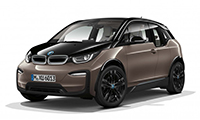 BMW i3 |
2019 to 2021 | 42 kWh | 246 km | |||
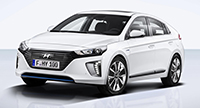 Hyundai Ioniq EV |
2020 to 2021 | 38 kWh | 270 km | |||
 Hyundai Kona EV |
2019 | 65 kWh | 415 km | |||
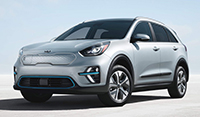 Kia Niro EV |
2019 | 64 kWh | 385 km | |||
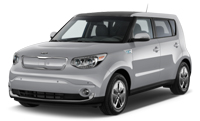 Kia Soul EV |
2020 to 2021 | 39 kWh | 248 km | 64 kWh | 383 km | |
 Nissan Leaf |
2018 | 40 kWh | 243 km | |||
 Nissan Leaf |
2019 to 2021 | 40 kWh | 243 km | 62 kWh | 364 km |
| $20,000 to $25,000 Vehicle |
Year(s) | Battery Size | Range | Optional Battery Size | Optional Range | |
|---|---|---|---|---|---|---|
 Chevrolet Bolt |
2018 to 2019 | 60 kWh | 383 km | |||
 Chevrolet Bolt |
2020 to 2021 | 66 kWh | 417 km | |||
 Hyundai Kona EV |
2020 to 2021 | 65 kWh | 415 km | |||
 Kia Niro EV |
2020 to 2021 | 64 kWh | 385 km | |||
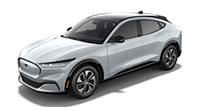 Ford Mustang Mach E |
2021 | 68 kWh | 340 km | 88 kWh | 483 km | |
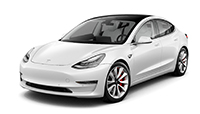 Tesla Model 3 |
2018 | 62 kWh | 425 km | 75 kWh | 400 km | |
 Tesla Model 3 |
2019 to 2020 | 50 kWh | 350 km | |||
 Tesla Model 3 |
2019 to 2021 | 54 kWh | 400 km | 75 kWh | 500 km |
Range is for a combination of city and highway driving as reported by the U.S. Environmental Protection Agency (EPA rating) or the estimated EPA rating announced by the manufacturer for vehicles not yet available. EPA ratings are averaged for a wide range of environmental conditions. Richmond drivers should achieve increased range due to our ideal environmental conditions for electric vehicles. For highway only driving at higher speeds, there is a detailed discussion of range requirements here.